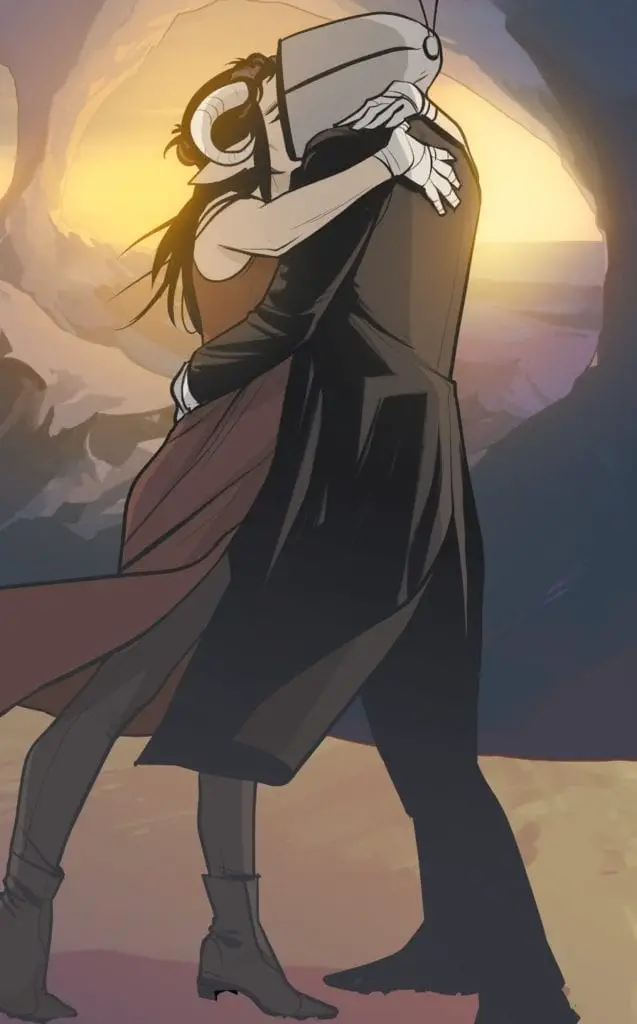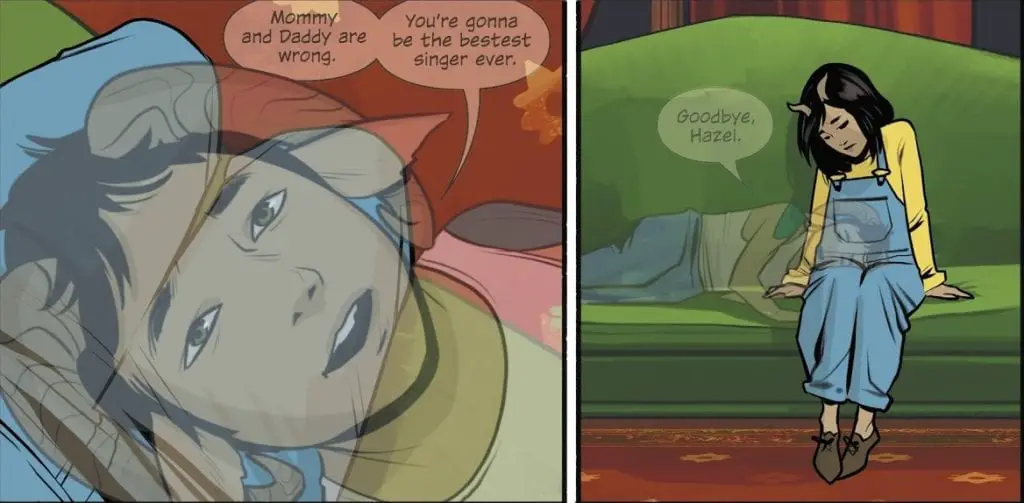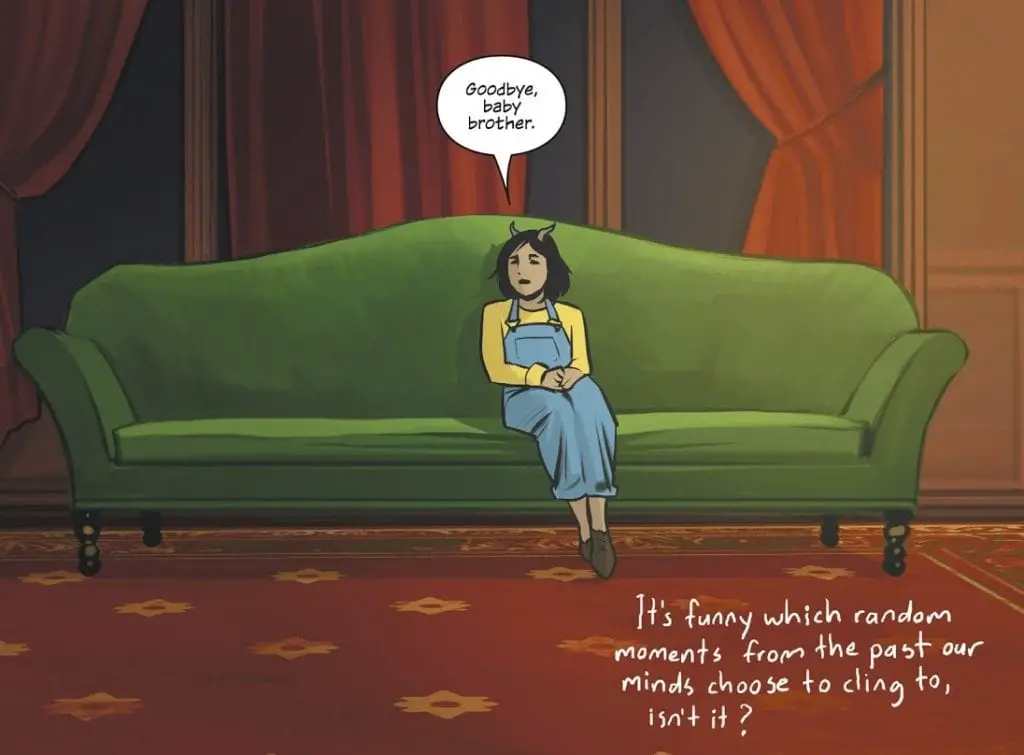It is a crazy ride this thing we call life, often stranger than fiction. If the world we know is one where a marginally successful entrepreneur can become president and jeopardise a nation’s standing via their childish behaviour, and where basic human rights are callously considered privileges, we may as well keep our expectations open for further insanity, right? I’ll leave the answer to that question to your discretion, dear reader. Nonetheless, the things we cannot argue with are those charming, cold certainties. Among others: mortality, physics, no means no, and ironically, the awareness that few things are truly certain.
Saga has been exemplar in exhibiting several of these certainties we cannot elude. Beyond the inescapable fact that everything dies, we should know by now that staying within our comfort zone in regards to expectations is a trap for fools. And you’re no fool, dear reader—you are reading this, after all. Whether by cause and consequence or by utter chance, some things are simply bound to happen. And we’re free to watch in horror, wonder, or sorrow.
Issue #46
“Do you know any lullabies?”
I’ll address this in detail a bit later in the review, but I feel it best to acknowledge the issue’s presentation early on. As per the abortion dynamic, one may think it in poor taste for a cover to blatantly display the procedure’s instruments. Regardless of political stances on the matter (I’m pro choice) and however you look at it, an abortion is not an easy procedure. Showing the cold, clinical side on the cover ignores the motives and emotions involved in the decision to undergo an abortion. But as we know by now, things are never so easy or succinct with Saga. Doubly so when considering the complexities before, during, and after an abortion.
I’m pleased to say this comic doesn’t disappoint when taking on the issue. There is a lot of maturity at work in the writing, as well as something of a commentary on first impressions and prejudice. And, of course, a subversion in tone and mood. But first things first…

Sir Robot has rescued Petrichor from her execution at the hands of Pervious’ hillbilly outlaws. Against his usual nature, he even goes as far as sparing their lives. Let’s give some credit where it’s due, though. It is, in fact, cowboy papa’s plea to spare their son, even if papa and mama must die, that influences Sir Robot’s decision. The rogues bugger off, and though they may return for payback, things are looking swell for Petri and Robot… but are they? Petrichor quickly protests against Sir Robot’s intervention. One may think she is not happy about being a damsel in distress, but that’s only the surface of it.
She actually wanted to die, feeling she had little to live for. In spite of her important role as ally for this lovely family and crew, she struggles with phantoms of her own. Namely, losing the person she loved. Mind you, Sir Robot himself is no stranger to this pain, and he also attempted suicide several issues ago. With this much in common, it should be no surprise they’ll tame their sorrows (at least temporarily) with a drink. As it turns out, they also bond over their avid reading habits, as well as their mutual dissatisfaction with the fact that D. Oswald Heist’s bibliography is the only thing aboard the ship. Amusingly, this may equate to Petri and Robot calling Alana and Marko a corny couple, you be the judge of that.
Soon enough, their talk turns political, as you do. Given the history between their peoples, the tone becomes hot, and not in the good way. The momentum in their arguing reaches a point where violence seems the only natural consequence. Alas, passion overtakes them and things get hot in the good way. Their kiss is actually the issue’s closing image, but I feel a kinder inevitability—that of like-minded-and-tempered people getting together—is in order.
Things do get significantly colder when stepping to the other side of the narrative.
We are now back outside the cutwife’s humble abode. She introduces herself as the Endwife, which sounds a bit subtler than cutwife. Just a bit. As I previously mentioned, things are not so simple regarding Alana’s (or anybody’s) abortion. This is a necessary measure to save her life, but the Endwife’s introduction as a ravenous-looking animal doesn’t help any. Marko is quick to draw the line between what must be done and anything else involving the Endwife. However, the shock of a first impression begins to fade as soon as we enter her house. She is also a parent, mother of an adorable litter of sleeping puppies.
Hazel stays up here, in the impossible presence of her brother Kurti, while the grown ups go to the basement. This is the start of the solution, but it also constitutes an end, as Kurti will disappear when the procedure is done. So, one process will beget two different, simultaneous developments here. A salvation and a farewell, figuratively united by an umbilical cord, one to yield consequence for the other.
Below, Marko has a chat with the Endwife while she does her work. Seeing other patients in recovery as well as hearing the reasons for their decisions to abort has him questioning some of his personal beliefs. Once more, his role as a soldier clashes with some of his practices. Namely his ‘pro-life’ stances, anti-capital punishment views, and overall pacifism. These are the values his parents gave him. And now he is faced with a little inevitability of his own. With the Endwife’s help, Marko has to acknowledge that ideologies can’t address the countless variables at work in life’s weird machinery. The world operates on socio-economical and ethical systems, and on these variables. And this we know as cold, hard reality.
We don’t get to see the procedure itself, but we can gauge its progress by what goes on upstairs. Kurti admits he’s scared, as he understands the implications of their visit. He asks for some comfort from his big sister during his final moments. However, for her own good, Marko has advised her to avoid developing too much of an attachment. This, and her experiences with loss, temper her reaction to Kurti’s requests. Death tends to do that. Regardless, she gives in to singing a lullaby for her baby brother. As she sings a “dumb song” Izabel taught her, Kurti lays his head on her lap, creating a lovely, bittersweet image.

The song is pretty dumb, but cute. The mood dissonance only makes it more painful when the end approaches. We know of the procedure’s success from the way Kurti starts to fade. Before he disappears altogether, he gets to praise Hazel’s singing and tell her she’ll be the ‘bestest singer ever.’ And, of course, a final goodbye. And just like that, Hazel says goodbye, alone on the couch. We may get into technicalities, but let’s not. This was indeed another loss in her life so far. On the inevitable way out of Pervious, we rise only with the solace that Alana will live.
The keyword of the day strikes back with a reminder. Though this is a sense of finality, many more adventures await out in this bonkers-as-shit galaxy. That is inevitability at its finest. Thanks for reading, lovelies. Take care, and stay tuned.

Saga Issue #46 Credits
Writer: Brian K. Vaughan
Artist: Fiona Staples

